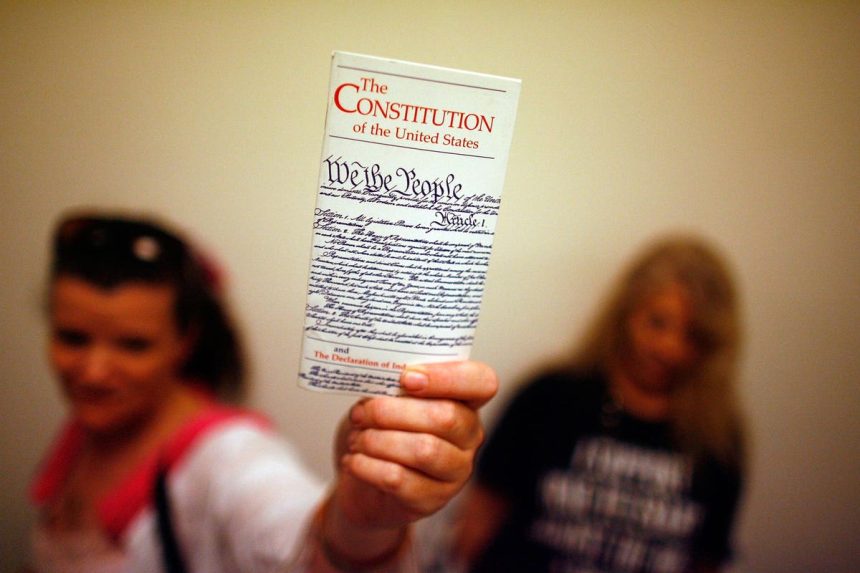Three of four college professors my freshman year were not only the best in their fields for American Government, but they were campus-wide favorites. Rigorous and demanding, they pushed us to learn and defend, to challenge and argue, and it was never unpleasant. They did not proselytize, as it should be. They were the essence of impartiality. When I told my “PolPhi” professor I wanted to become a lawyer, he counseled me, “If you want justice, go work in politics.” He didn’t say which side to take.
But today, a majority of students hear opinions rather than knowledge. And they lack the foundation that makes deeper learning of American Government possible. On the Nation’s Report Card, as the National Assessment of Educational Progress (NAEP) is known, fewer than one in four eighth grade students are proficient in civics, along with scoring worse on history than at any time since the test was first administered 29 years ago.
Students with the least access to quality education options are declining most rapidly. According to EdSource, lower scores in history and civics dominated racial and ethnic groups except the top 10% of performers. “This reinforces our concern about polarization in general knowledge and views of civics and history among the next generation,” said Stanford Economist Eric Hanushek.
Constitution 101: “Lest We Fall Apart…”
In 2022, only 51% of eighth graders tested could correctly identify the role of all three branches of government. As educator and USA Today Contributor, Patrick Kelly explained in May, “The eighth graders who took these tests last year are finishing ninth grade in the coming weeks. We have a lot of ground and just three years to make up before they graduate, head to college or the workforce, and are asked to fully participate in civic life.”
This fact is what motivated Jeff Rosen, head of the nonpartisan National Constitution Center to create a new program to increase discourse about the Constitution. Last November, his NCC and Khan Academy announced a collaboration to create Constitution 101, a free online course to give high school students – and probably anyone who really needs it – the chance to learn about the core principles of the Constitution.
The program is set to begin in 2024, and it can’t come soon enough. For one, there’s the educational need. And, for two, there’s the social and cultural need. As education advocate and supporter of the new program, Janine Yass put it, “[This] objective education on the Constitution can help reverse the polarization of our country.”
Let’s hope for widespread success of the program, because right now it’s bleak out there. And it’s not just kids who are un-, ill-, or mis-informed about the underpinnings and fundamental workings of our nation. Many parents and grandparents are little better off than their school-age children and grandchildren.
In 2018, the Annenberg Public Policy Center at the University of Pennsylvania reported that only 32% of adults could correctly identify all three branches of government. And yet those who hurl the “how dare they” fury at Congress, the Executive Branch, and the Courts alleging grave violations of Constitutional protections may simply not understand when those branches are simply doing their jobs as required by the Constitution.
Is Americans’ declining civic knowledge the problem?
American Enterprise Scholar Yuval Levin posits that it’s not the Constitution that is failing us but our lack of understanding. “What if we are divided less because our Constitution is failing us than because we are failing the Constitution,” he asks. “What if the framework of our democratic republic could offer us a guide to the hard work of fostering cohesion and forging common ground?
And that is the crux of the matter, which James Madison addressed nearly 250 years ago.
“On the one hand, Madison insisted that disagreement about fundamental questions is inherent and unavoidable in a free society,” says Levin. ‘‘As long as the reason of man continues fallible,’ [Madison wrote] ‘and he is at liberty to exercise it, different opinions will be formed.
“[But, Madison added,] Hearken not to the unnatural voice which tells you that the people of America, knit together as they are by so many cords of affection, can no longer live together as members of the same family; can no longer continue the mutual guardians of their mutual happiness; can no longer be fellow citizens of one great, respectable, and flourishing empire.’”
“Americans will never stop disagreeing, yet they should never give up on living as one nation. Unity is achievable provided we do not expect it to mean unanimity…,” Levin says. “Simply put…unity does not mean thinking alike; unity means acting together.”
That mutual guardianship of mutual happiness can only be achieved with a mutual understanding of the principles on which our Constitution was conceived and born, and of the arguments, past and present, that keep it a living document critical to our success as a nation.
Nearly all of the attention given to the many failures of our schools focus on skills learning. Reading, math, the sciences all are deficient and in need of dramatic improvement. But none of these should take precedence over civics.
While many rightly eschew creeping government encroachment, reading Federalist 51 illuminates why the Founders set up government as they did. “In order to lay a due foundation for that separate and distinct exercise of the different powers of government, which to a certain extent is admitted on all hands to be essential to the preservation of liberty, it is evident that each department should have a will of its own; and consequently should be so constituted that the members of each should have as little agency as possible in the appointment of the members of the others…
“It may be a reflection on human nature, that such devices [checks and balances] should be necessary to control the abuses of government. But what is government itself, but the greatest of all reflections on human nature? If men were angels, no government would be necessary.”
But as AEI’s Levin counsels, we must learn how it works. NCC’s Rosen agrees. “We have to understand the full history [of the country] so we can learn from it.”
An uneducated populace – young and old – ignorant of the meaning behind, and the workings of our Constitution, are a grave threat to this nation. We need not think alike, but ultimately, as Madison argues, we must act together…lest we fall apart.
Read the full article here






